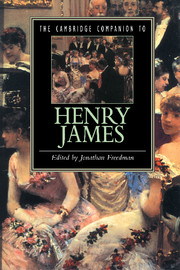Book contents
- Frontmatter
- Introduction: The Moment of Henry James
- 1 Men, Women, and the American Way
- 2 The James Family Theatricals
- 3 Henry James at Work
- 4 Henry James and the Invention of Novel Theory
- 5 Henry James and the Idea of Evil
- 6 Queer Henry In the Cage
- 7 The Unmentionable Subject in "The Pupil"
- 8 Realism, Culture, and the Place of the Literary: Henry James and The Bostonians
- 9 Lambert Strether's Excellent Adventure
- 10 James's Elusive Wings
- 11 Henry James's American Dream in The Golden Bowl
- 12 Affirming the Alien: The Pragmatist Pluralism of The American Scene
- Suggestions for Further Reading
- Index
- Series List
9 - Lambert Strether's Excellent Adventure
Published online by Cambridge University Press: 28 May 2006
- Frontmatter
- Introduction: The Moment of Henry James
- 1 Men, Women, and the American Way
- 2 The James Family Theatricals
- 3 Henry James at Work
- 4 Henry James and the Invention of Novel Theory
- 5 Henry James and the Idea of Evil
- 6 Queer Henry In the Cage
- 7 The Unmentionable Subject in "The Pupil"
- 8 Realism, Culture, and the Place of the Literary: Henry James and The Bostonians
- 9 Lambert Strether's Excellent Adventure
- 10 James's Elusive Wings
- 11 Henry James's American Dream in The Golden Bowl
- 12 Affirming the Alien: The Pragmatist Pluralism of The American Scene
- Suggestions for Further Reading
- Index
- Series List
Summary
What is there in the idea of Too late-of some . . . passion or bond . . . formed too late? . . . It's love, it's friendship, it's mutual comprehension-it's whatever one will.
-James’s Notebook, February 1895What then did James mean by sensations, passions or pleasure?
-Maxwell GeismarLive all you can; it's a mistake not to”: every heart vibrates to that iron string, no doubt, but what on earth does it mean? As James emphasizes in the Preface, the “whole case” of The Ambassadors (1903) centers in Strether's tutorial effusion to his young painter-friend, Little Bilham, during Gloriani's garden party, but this is fortune-cookie advice at best: “It doesn't so much matter what you do in particular, so long as you have your life.” The key to Strether, apparently, lies in his belatedness - or better, his belated discovery of belatedness under the barrage of impressions that play havoc with his “categories” in Europe. It is “simply too late,” he feels, too late to repair “the injury done his character” by - well, by just about everything: his proverbial New England conscience, his botched job of parenting, his unbuilt “temple of taste,” his cobbled career of all strain and small gain, of much utility for others but meager identity for himself (A 131, AN 308, A 63). There is nothing obscure about his hurt - except, after all, in the kind of “Enjoyment” (that’s James’s capital E) that has eluded “poor fine melancholy, missing, striving Strether” (N 226, 383).
- Type
- Chapter
- Information
- The Cambridge Companion to Henry James , pp. 169 - 186Publisher: Cambridge University PressPrint publication year: 1998
- 3
- Cited by

